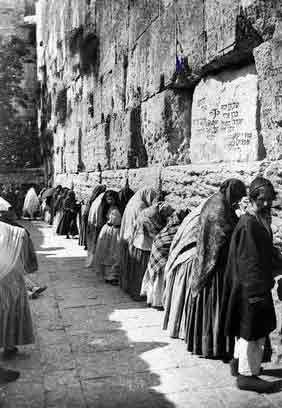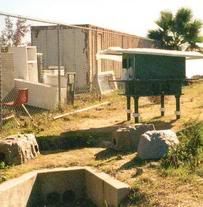Israel: Women of the Wall
* Updated links
** Clarification
I went to the Wall. This expression seems so fitting, now. I came, I saw, I overcame.
It was the first night of our arrival after a bloated set of speeches at a dinner most of us could barely swallow, which weighed us down even further, after suffering the beginnings of monster jetlag. Our tour bus fought through the darkened and narrow streets of Jerusalem, with traffic pressing on either side of us, to reach the golden lit walls of the golden city celebrated in fact, fiction and vision.
All I remember is this: after going through security, there was the Western Wall (Kotel, aka, The Wailing Wall), as I had viewed* it, and longed to touch it, ; I had watched the comings and goings of thousands of faithful and curious souls over the years and envied them all. And although many had been surprised by its immensity, especially its height, I was surprised by how diminished it appeared, so unlike all the images of it.
Standing there, in the Plaza, facing the women's section I was impelled towards the Wall.
The women really do wail. The women recite psalms, force warm and fervent notes against the challenging and cold cracks already weighted with wings of words and supplication, and wear away the stone with their hands and their tears. Each time that I attended, the ascent of crowded words and mourning remained the same. The murmurs, the weeping, the recitation, the anguished and earnest whispered intimacies. The stone has become a smooth and glossy set of veins and arteries of rock weathered by lament and hands and lips and breath. You can trace the history of every person with your finger tips and know them.
Meanwhile, I have only second-hand reports of the men's side. This much I do know: if you are in need of a minyan to say Kaddish for Yarzheit, it takes a man about 2 minutes to find a minyan. You just have to ask. A group is eager to gather around and affirm G-d's sovereignty. What else goes on, I do not know.
I remember most vividly being at the Wall on Friday, around noon time. The bustle to ready for Shabbat was charged with deadly earnestness. Military and police congregated in impressive mass and vehicles on the plaza floor. Worshippers well known at the security checkpoints, passed through without examination. The Chareidi, looking fastidiously dapper while selling red strings was really pushing it. Tourists passed through in managed streams to gaze at 'the Jews praying at the Wall'. It had been raining and I witnessed Chareidi looking damned elegant in their long black coats, yet with plastic rain hats or plastic shopping bags over their shtreimels, or black hats. One ventured into the sunlight after davenning and lit up. (pix to follow)
That Friday afternoon took my breath away. It was just past noon. I was in contemplation in the women's section. The bells from all the churches in the Old City began to ring, to peal, to sing. For the longest time. The mezzuin's voice soared across the air from a minaret. And I could hear the men davenning beyond the mechitza, voices raised in worship. All together. Such harmony. While a woman, there and there and there, down the truncated length of the Wall, murmured and muttered and recited and wailed.
We toured the tunnels below the Wall. I had not been able to find my best friend's note the previous day. I felt so distressed. Getting to Jerusalem has taken a lifetime; getting the note there seemed to take as long. And now it was gone. Beneath the upper world, the Wall continues deep down, unbroken, with notes scattered throughout, scrunched tightly within its joints. At one point we encountered another gate, solid, unexcavated, that faces the Holy of Holies. Well, I stood there looking up at that great and simple arch, in awe. Simply awed by the possibility. While searching for a piece of paper, I discovered my friend's note. I secured it amongst the stones of the gate. I consider this my finest moment in Israel.
I heard a story about the Wall. My rabbi told me how his wife-to-be and he had come to the Wall, and she was wearing a sleeveless dress and someone had spit on her. All for the glory of G-d, I guess. She burst into tears and has not been back since then.
While sojourning in Jerusalem the following events occurred:
The first morning the rabbi went off to an Orthodox shul to daven Shaharit; he returned deflated and annoyed because the service was mechanical and speedy.
I, hearing of this, was pissed and upset, because I assumed that we Conservative-affiliated types would get together for morning minyan. I was wrong. I had brought my tallit and tefillin and expected to daven. I was so wrong.
My rabbi, being the total mensch he is, found us a Conservative synagogue and I happily davenned there for a couple of days. As far as I know, he and I were the only ones who participated. I hope I am wrong. Perhaps there was a minyan going on out there, somewhere in a room in the hotel. A huge number of our group attended Friday night services.
Then one day we stopped to tour a Tunisian synagogue. Our bus was mixed with C and O. The guide announced that we would be stopping to daven Mincha-Maariv there before the tour of the premises. He said, that "men could daven, and...women could daven, or wait." Well, the women did not even have a mechitza to daven behind/beside (and I had accepted the idea of "when in Rome, etc."). While the sounds of Hebrew chant, of men's voices, floated around us, the women scurried up the stairs from one floor to another, searching for the women's section. We discovered that one floor was another sanctuary, and the top floor was locked. So, there was nowhere for women to daven alongside the men. But they could wait on the bench in the hallway outside the room where the men were ensconced and enrapt.
A couple of women davenned in the sanctuary, separately, and others, I noticed as I walked out, sat quietly on a bench and waited. I almost took a photograph, the scene was so striking. Several women sat on benches facing the room where the men davenned, and each woman's face showed patient resignation and acceptance of circumstances. I was stunned but did not take a picture because somehow I felt that the moment was too naked to take advantage of. I imagine it would not occur to any of them to question things or to desire more. Yet, heck, here I was, and I did!
When I approached the 'almost 18 year old' shaliach tzibur about making a women's minyan she was ill equipped to deal with such decisions at such a tender age. Instead, she offered me a song and dance elucidating the factors that would have made a women's prayer group, never mind a minyan, impossible. In distress I went back to the bus and waited. When I vented to some poor man from our congregation who was sitting beside me about having no outlet to daven with community, he tried to placate me by saying they were late and the davenning only took 4-5 minutes, no big deal.
A couple of days later, there was davenning in this amazing synagogue in Tzfat (Safed)- the men stayed out in solidarity with the women. I am still wondering how they got a clue.**
It is the 800th anniversary of the Rambam's death. We travelled to his grave in Tiberias. My rabbi was thrilled to be there since Maimonides is his hero; he also gave a unifying drash on a portion of The Guide for the Perplexed, by his fave sage. Recently they have placed a high wooden mechitza dividing the length of the tomb. When I got to the top of the stairs where his tomb resides, I saw a sign that said "ladies" to the left and "men" to the right. I was so grateful because I so needed to pee. I followed the sign and ended up in an area with more graves. I had no idea that the signs were meant to direct people to the respective regulated sides of the mechitza! We then bought arak with the purported picture of Maimonides on the label for our minyan back home. It has been affectionately distributed as "Rambam Rotgut".
The very first night, when I hit the Wall, I touched glassy, worn stone, so cold. I pressed my forehead against it and wept. I wept for 15 minutes, without words. I did not pray. I did not plead. I was speechless. And I left without saying a word.
I had come home and I knew it. This was it, the centre of the universe, the centre of all things. I did not think it, but I surely felt it. And peace was my gift, unasked for and unearned. Not stillness, not lack of turmoil, but peace. A sense of wholeness, completeness. Did it make my world better? No. But interiorly, in some way I am changed. Something has been added. I believe that G-d adds, and does not subtract.
And so, G-d has added this:
My 'almost 18 year old' roomie pointed out (without reckoning the implication, especially for her) that the women of the wall prayed alone, separately and never got together.
My Conservative allies, the men, when push-came-to-shove, took the path of least resistance- sometimes unwittingly, yet still mesmerised by Orthodox hegemony. I went into this thinking we were all in this together in the sense that it was unspoken about how we would behave- that we all knew what we stood for and would do it together. I was so wrong.
Having been nurtured under egalitarian auspices, encouraged to wear tallit and tefillin, to chant Torah and to lead prayers, it was a surprise to encounter this weird Orthodox/Conservative exclusion. I am so infuriated. I hate Orthodoxy and I am not too thrilled with some C types either. Hello??? I would have had to make a special case- if I needed a minyan. That is what it would have taken. A few minutes in a minyan? Not important? I beg to differ.
And at the Wall, a C man cannot ask for a mixed minyan. And a woman cannot ask for any sort of minyan. Nor can women depend on each other or gather together, cannot as a whole affirm G-d's sovereignty, or even bond, as men can. They can only wail, one by one. While men can look to depend on each other and wail together.
I have not described myself as a feminist, but I do know that the soul needs what it needs and that no man can interdict that. My sojourn in Israel has been such an awakening. I possess a crummy voice (I am such an opera freak and an afficionada of chazzanut) and I know little Hebrew but I am going to learn to lead daily prayers. And I vow, like Scarlett O'Hara, that I will never go hungry again. I think that the events speak for themselves. And as a woman, I learned exactly where I stand. And I aim to change that. For the sake of those women who hunger for something more; yet, more importantly and selfishly, for my sake- I have had the "egalitarian" stuffing knocked out of me and a sense of deprivation and injustice where it really matters and where it really hurts can make you take stock.
My Israel experience has also left me with this other legacy: I have come to despise Orthodoxy and its insistence on exclusivity. I used to be indifferent. I think I have regressed, emotionally. But that experience has surely been a spur to make things better. I have heard a bit, in the past, about the The Women> of the Wall*, who tried to worship at the Wall in a group and who were reviled and physically assaulted. Now I know exactly what they are fighting for and I am with them. They are beyond brave. So many people think the fight is about form, and that may be partially so. For me, the assertion is about soul. All women of the Wall have so little religious freedom . It is so self-evident. You have to have been there to experience the inequity. To experience the repression of religious expression. To experience your delight in things unabashedly spiritual, and a longing for holiness, casually dismissed. There, at the heart of all things. It is disappointingly real.**I have since learned that the men were herded like sheep into the room, not realising that the women had no place to go. By the time they noticed it would have been too embarrassing for all concerned, and disruptive, to leave. The rabbis complained, and the tour rep and guide, both apologised. To the men! And if I hadn't complained about it now, I would never have known.






 Mama
Mama
 Josh
Josh

 Han
Han
 Emet
Emet
 Sammie
Sammie
 Marly
Marly
 Tan Guy
Tan Guy
 Socks
Socks
 Big Daddy
Big Daddy
 Chaplin
Chaplin
 Coffee
Coffee
 Dove
Dove

 Bosco
Bosco
 Zena
Zena


<< Home